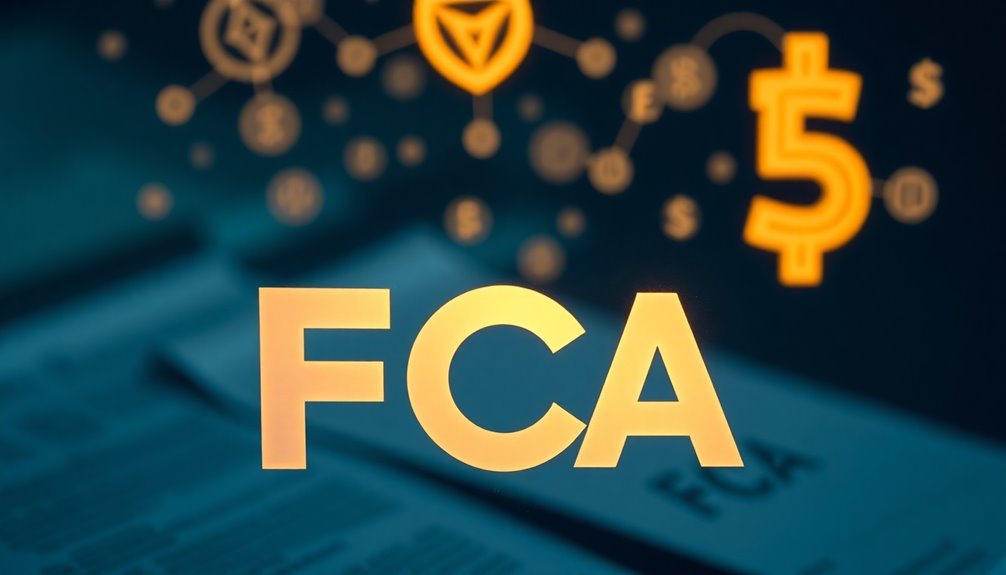The FCA plays a crucial role in regulating crypto assets by defining what activities require authorization, like issuing and marketing crypto. They ensure firms comply with stringent Money Laundering Regulations while monitoring the trading and custody of these assets. Stablecoins need specific approval, with strict rules on asset backing and record-keeping. However, the FCA doesn't cover every aspect of the crypto world, especially outside their financial crime framework. Understanding the full scope of their regulations can help you navigate this complex landscape more effectively. There's always more to discover about their evolving role and impact on the market.
Key Takeaways
- The FCA regulates cryptoassets by classifying them into specified investments, e-money, and payment services, requiring authorization for various activities.
- Authorization is mandatory for issuing, marketing, and storing cryptoassets, ensuring compliance with financial crime standards.
- The FCA distinguishes between regulated and approved stablecoins, mandating strict record-keeping and compliance measures for fiat-backed versions.
- Regulatory updates impact corporate investment strategies, requiring firms to adapt to evolving compliance and authorization processes.
- Elections can create uncertainty in the regulatory landscape, affecting the FCA's approach to crypto assets and future legislation.
Fca's Regulatory Framework Overview

The FCA's regulatory framework for crypto assets defines how different types of cryptoassets fit within the regulatory landscape, ensuring that you understand which activities require authorization.
The FCA provides guidance on cryptoasset classifications, including specified investments, e-money, and payment services. You'll need to be aware that activities like issuing, marketing, or storing cryptoassets require authorization.
As the FCA's regulatory perimeter expands, it will cover cryptoasset trading and custody, among other activities. Compliance with the Money Laundering Regulations and Financial Promotions regime is critical, as the FCA enforces strict financial crime standards.
To enhance compliance, firms are expected to meet stringent financial crime standards that are equivalent to those in traditional finance.
Regulatory Updates on Stablecoins

As the FCA expands its regulatory framework, recent updates on stablecoins highlight the importance of compliance for issuers.
If you're involved in issuing fiat-backed stablecoins in the UK, you must get FCA authorization. The FCA distinguishes between "regulated" and "approved" stablecoins, emphasizing that regulated ones are issued by authorized firms.
You'll need to ensure that your stablecoin's value is backed by equivalent assets and maintain strict record-keeping and asset segregation practices. Additionally, compliance with anti-money laundering and counter-terrorism financing regulations is essential. The introduction of digital settlement assets is a key aspect of the FCA's evolving framework.
The FCA's policy document outlines requirements for consumer protection and governance, reinforcing the need for robust cybersecurity measures.
Cryptocurrency Price Volatility Analysis

Understanding cryptocurrency price volatility is essential for any investor looking to navigate this dynamic market. Market sentiment plays a crucial role, as news and social media can swiftly influence investor behavior. Positive developments may drive prices upward, while negative reports can trigger sharp declines. Additionally, supply and demand dynamics significantly contribute to volatility; limited asset supply, like Bitcoin, can amplify price fluctuations when demand surges. Large holders, or "whales," can also create instability by buying or selling large quantities. Technological advancements, including security breaches, can lead to panic and price drops. Lastly, regulatory changes can cause unexpected market shifts, making the crypto landscape particularly sensitive to news and updates. Staying informed is key to managing your investments effectively. Furthermore, the increased institutional investor participation during recent years has also heightened market volatility, emphasizing the need for strategic investment approaches.
Corporate Investment Trends

Corporate investment in crypto assets is rapidly gaining traction, with many companies recognizing the potential for diversification and growth. As corporate investment in crypto assets continues to rise, organizations are increasingly looking towards emerging markets and technologies to enhance their portfolios. Notably, Dubai’s innovative blockchain hub has become a focal point for businesses seeking to leverage the benefits of decentralized finance and secure transaction frameworks. This environment not only fosters innovation but also attracts a multitude of startups and established firms eager to capitalize on the evolving cryptocurrency landscape.
You'll see treasury departments diving into crypto, acquiring the know-how to manage these assets effectively. As you consider your options, think about whether to hold custody of crypto in-house or outsource it to a third party, weighing the risks and benefits of each choice. The growing demand for transparency in private equity also parallels the need for clarity in crypto asset management, as investors increasingly seek detailed information.
It's crucial to stay compliant with evolving regulations, particularly those from the FCA. Make sure you have clear objectives for your crypto investments, conduct thorough market analysis, and implement robust cybersecurity measures to safeguard your assets. Additionally, many companies are finding that accepting bitcoin as payment not only attracts new customers but also enhances their competitive advantage in the marketplace.
Regulatory Impact of Elections

While elections often stir uncertainty in various sectors, the regulatory landscape for crypto assets is particularly sensitive to political shifts. As the government aims to legislate a future financial services regime for crypto assets, the timing of elections can impact this timeline. In 2024, the new government plans to move forward with legislation to bring more crypto activities into the FCA's regulatory perimeter, but potential delays due to elections loom. Firms undertaking regulated activities will need to seek FCA authorisation under the new regime, with no transitional arrangements for existing providers. Non-compliance could affect future authorization applications under the upcoming regulatory framework, making adherence crucial. You'll want to keep an eye on how these political changes shape the regulatory framework, as it could significantly affect your operations and compliance strategies in the crypto market.
Emerging Technologies in Regulation

As regulators adapt to the rapid evolution of financial technologies, emerging technologies in regulation are reshaping how compliance is managed across the industry.
You'll notice Regulatory Technology (RegTech) automating compliance processes, cutting costs, and reducing human error. AI-powered monitoring ensures real-time adherence to regulations while enhancing data privacy. Financial inclusion is also a growing focus within fintech, as it aims to provide underserved populations with access to necessary financial services. The rise of Intelligent Tutoring Systems (ITS) in education highlights how personalized approaches can enhance learning outcomes, similar to how fintech aims to tailor solutions for diverse customer needs.
Insurtech streamlines insurance processes, offering personalized policies through AI and IoT integration.
Robotic Process Automation (RPA) takes care of repetitive tasks, improving accuracy and scaling easily with growth.
Finally, the Banking of Things (BoT) enables secure, contactless transactions, enhancing customer convenience.
Together, these technologies not only boost efficiency but also help you navigate a complex regulatory landscape more effectively.
Frequently Asked Questions
What Types of Cryptocurrencies Does the FCA Regulate?
The FCA regulates two main types of cryptocurrencies: security tokens and e-money tokens.
Security tokens represent financial assets like shares or bonds and have similar regulations to traditional investments.
E-money tokens, on the other hand, are designed for payments and must comply with specific e-money regulations.
If you're dealing with utility or exchange tokens, keep in mind that these aren't regulated by the FCA, so you should be cautious.
How Does the FCA Handle Fraudulent Crypto Activities?
The FCA tackles fraudulent crypto activities by implementing strict regulations and oversight.
They monitor marketing and promotions to protect investors, ensuring firms comply with consumer protection laws.
You'll see alerts about potential scams, and they actively scan websites to identify fraudulent ones.
By engaging with app stores, they work to remove misleading apps.
If firms don't comply, they face hefty fines, keeping the crypto space safer for everyone involved.
Are All Crypto Exchanges Required to Register With the FCA?
Not all crypto exchanges are required to register with the FCA.
Only specific types, like cryptoasset exchange providers and custodial wallet providers, must comply.
If you're running a fiat-to-crypto or crypto-to-crypto exchange, you'll need to register.
Your activities must also be commercial and regular within the UK.
Ensure you meet the AML and KYC requirements to avoid penalties and maintain your firm's reputation in the market.
What Penalties Can the FCA Impose for Non-Compliance?
Imagine a ship navigating turbulent waters; if it strays off course, the captain faces serious consequences.
Similarly, if you fail to comply with FCA regulations, you might encounter significant monetary fines, like the hefty one imposed on CB Payments Limited.
The FCA can also take enforcement actions, scrutinizing your operations.
Non-compliance could lead to legal repercussions or even hinder your ability to sail smoothly in the financial seas.
Stay vigilant and adhere to the rules.
Does the FCA Provide Consumer Protection for Crypto Investors?
Yes, the FCA does provide consumer protection for crypto investors.
They focus on ensuring you understand the risks involved, including volatility and potential losses. By requiring firms to disclose timely information and conduct thorough due diligence, the FCA aims to empower you to make informed decisions.
Additionally, they've implemented cooling-off periods and suitability assessments to help protect your interests, while working to prevent fraudulent activities in the market.
Conclusion
In conclusion, understanding the FCA's role in crypto assets is crucial for navigating this ever-changing landscape. With regulations evolving, keeping your finger on the pulse is key to making informed decisions. Whether you're looking at stablecoins or corporate investments, being aware of these dynamics can help you stay ahead of the game. So, don't let the complexities trip you up—embrace the knowledge and be ready to seize the opportunities that come your way!









